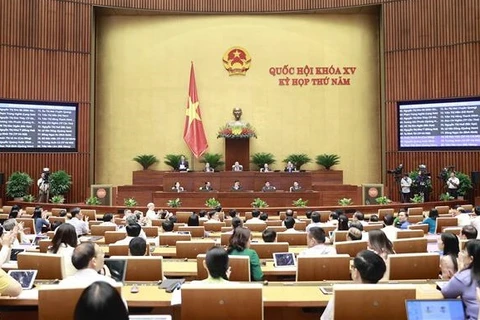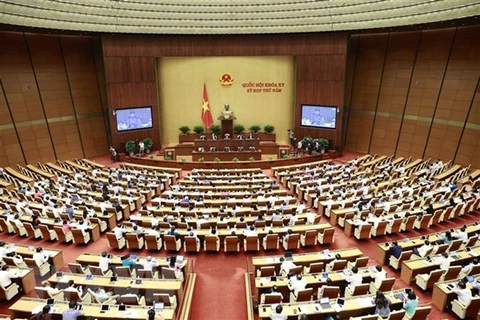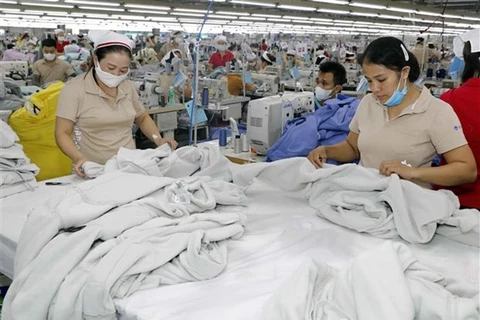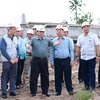 Noi Bai-Lao Cai Expressway. Synchronised infrastructure development is a crucial part of 2024 development plan. (Photo: VNA)
Noi Bai-Lao Cai Expressway. Synchronised infrastructure development is a crucial part of 2024 development plan. (Photo: VNA) The directive acknowledges that in the coming year, domestic and international circumstances necessitate a continued focus on overcoming limitations and weaknesses, while building upon and promoting the achieved results.
Efforts must be made to address difficulties and challenges and strive for the highest level of completion of the designated tasks. These endeavours will contribute to the successful implementation of the objectives outlined in the five-year socio-economic development plan for 2021-2025.
In line with this, the Prime Minister has called upon ministries, central agencies, government bodies, economic groups, state corporations, provinces, and centrally-run cities to concentrate on constructing the socio-economic development plan for 2024.
To fulfil this directive, ministries, central agencies, and localities are required to develop a report on the Socio-Economic Development Plan for 2024. These reports should primarily assess the implementation of the Socio-Economic Development Plan for 2023. By evaluating and estimating the implementation of the plan across all sectors and fields assigned to them, ministries, central agencies, and localities should provide a comprehensive, substantive, and accurate account of the results achieved.
The evaluation should particularly emphasise maintaining macroeconomic stability, controlling inflation, promoting growth, and ensuring key economic balances. In this regard, specific aspects such as credit management, interest rates, and timely capital allocation for production and business activities need to be clarified.
Additionally, the evaluation should cover industrial production, import and export trends, social investment attraction, foreign direct investment (FDI) capital, corporate bonds and securities markets, and the real estate sector. It should also address disease prevention and control measures, the strengthening of healthcare systems, and the resolution of shortages in human resources, medicines, equipment, supplies, and biomedical products.
Moreover, the directive highlights the need to achieve significant breakthroughs in perfecting the socialist-oriented market economy institution, improving the legal system and law enforcement organisations, and developing high-quality human resources while increasing the application of science, technology, and innovation. Synchronised infrastructure development is also a crucial aspect to be considered.
The socio-economic development plan for 2024 should be based on a comprehensive and accurate assessment of the situation and the results achieved in the implementation of the 2023 plan. It should also take into account the current and future national, regional, and international contexts, as well as the opportunities and challenges faced by various industries, sectors, and localities.
The plan should effectively respond to minimise any adverse impacts on the country's socio-economic development. Furthermore, it should align with the guidelines set by the Party, resolutions of the National Assembly and the Government, directives from the Prime Minister, the 2021-2030 Socio-economic Development Strategy, and the five-year plan for 2021-2025.
Given the significance of the year 2024 in completing the five-year plan, especially considering the long-term consequences of the COVID-19 pandemic, the objectives, orientations, and solutions outlined in the plan must be robust, decisive, and effective. They should ensure feasibility and synchronisation while aligning with the capacities of various sectors, levels, and localities. The plan should facilitate resource mobilisation, allocation, and utilisation, driving substantial and transformative changes in socio-economic development and successfully accomplishing the goals of the 2021-2025 plan.
Main orientations and tasks
Ministries, and central and local agencies should thoroughly examine and propose the major orientations and tasks for 2024, ensuring consistency with common goals while considering the practical conditions and development levels of each industry and locality.
These tasks should firmly adhere to and translate the viewpoints, goals, three strategic breakthroughs, six key tasks, twelve main task groups, and solutions outlined in the Resolution of the 13th Party National Congress into concrete actions.
The orientations should maintain macroeconomic stability, control inflation, promote growth, and ensure key economic balances; accelerate restructuring efforts, enhance internal capacity, self-reliance, resilience, and adaptability of the economy; coordinate fiscal, monetary, and other macro policies effectively; ensure credit availability for the economy, with a focus on production, business activities, priority areas, and growth drivers; promote domestic market development, expand export markets, diversify products and supply chains, and strive for a sustainable trade surplus.
Other major orientations include continuing to build and complete the institution of a socialist-oriented market economy; improving the quality and efficiency of administrative and judicial activities, providing judicial assistance, and enforcing judgments; accelerating the construction of strategic infrastructure, particularly national transport infrastructure projects that are key, inter-regional, and urban in nature; and enhancing the quality and effective utilisation of human resources.
State budget estimate for 2024
The directive outlines the task of developing the state budget estimate for 2024 and a three-year state budget-financial plan covering the period from 2024 to 2026. The focus should be on the following key contents:
To begin with, the state budget revenue estimate for 2024 must align with current policies and regimes, ensuring the correct, sufficient, and timely collection of state budget revenues. This should be accompanied by analysis and forecasting of the situation, which involves closely assessing the ability to realise the state budget revenue in 2023 as well as estimating the revenue for 2024.
Factors such as changes in legal policies on tax support, fees, and charges, the implementation of a tax reduction roadmap to fulfil commitments to international economic integration, and the increase or decrease in budget revenue due to the government's commitments to foreign investors should be specifically calculated.
Furthermore, administrative reform measures should be vigorously implemented to modernise revenue management, strengthen the fight against revenue loss, especially in business and real estate transfer taxes, effectively manage new revenue sources arising from the development of the digital economy and cross-border e-transactions, and enhance tax inspection and examination to combat transfer pricing, tax evasion, and tax fraud.
The domestic revenue estimate for 2024 should strive for an average growth of about 5-7% compared to the estimated implementation in 2023 (excluding factors of revenue increase and decrease due to policy changes).
The growth rate in each locality should be consistent with economic growth and revenue sources generated in that locality, taking into account the strengthening of revenue management, combating revenue loss, and recovering tax debts. Additionally, the estimated revenue from import and export activities in 2024 is expected to increase by an average of 4-6% compared to the estimated implementation in 2023./.
VNA























